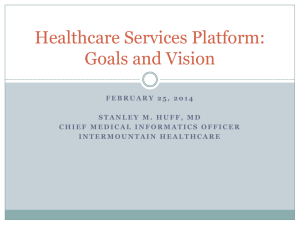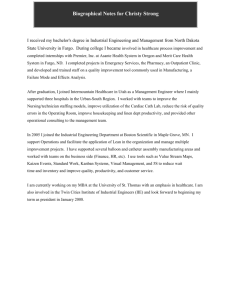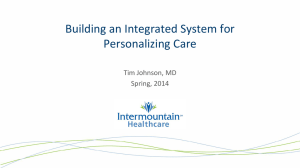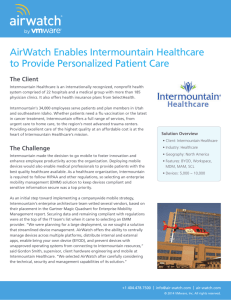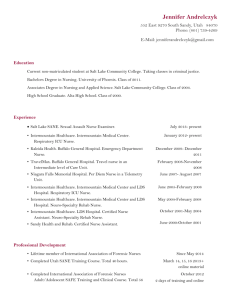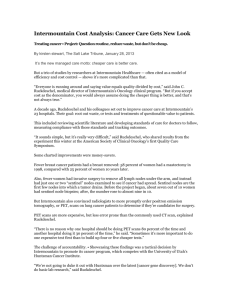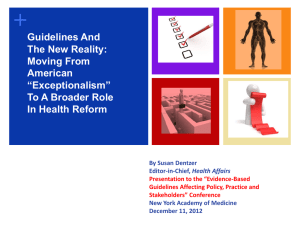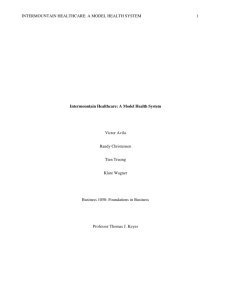English - Intermountain Healthcare
advertisement
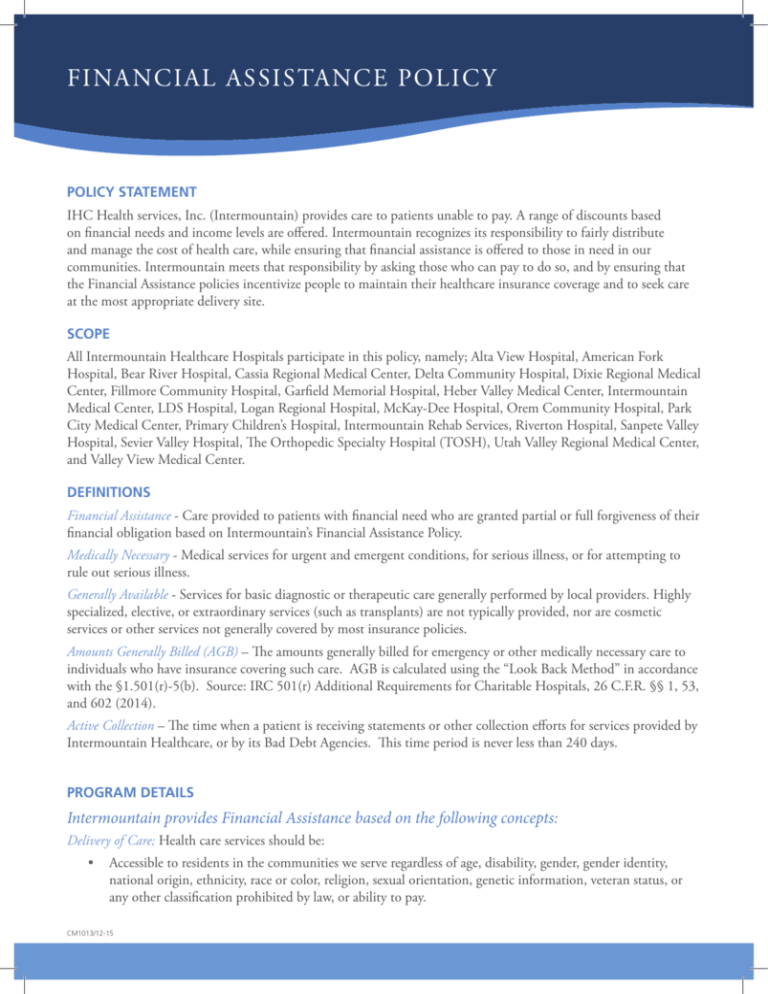
FINANCIAL ASSISTANCE POLICY POLICY STATEMENT IHC Health services, Inc. (Intermountain) provides care to patients unable to pay. A range of discounts based on financial needs and income levels are offered. Intermountain recognizes its responsibility to fairly distribute and manage the cost of health care, while ensuring that financial assistance is offered to those in need in our communities. Intermountain meets that responsibility by asking those who can pay to do so, and by ensuring that the Financial Assistance policies incentivize people to maintain their healthcare insurance coverage and to seek care at the most appropriate delivery site. SCOPE All Intermountain Healthcare Hospitals participate in this policy, namely; Alta View Hospital, American Fork Hospital, Bear River Hospital, Cassia Regional Medical Center, Delta Community Hospital, Dixie Regional Medical Center, Fillmore Community Hospital, Garfield Memorial Hospital, Heber Valley Medical Center, Intermountain Medical Center, LDS Hospital, Logan Regional Hospital, McKay-Dee Hospital, Orem Community Hospital, Park City Medical Center, Primary Children’s Hospital, Intermountain Rehab Services, Riverton Hospital, Sanpete Valley Hospital, Sevier Valley Hospital, The Orthopedic Specialty Hospital (TOSH), Utah Valley Regional Medical Center, and Valley View Medical Center. DEFINITIONS Financial Assistance - Care provided to patients with financial need who are granted partial or full forgiveness of their financial obligation based on Intermountain’s Financial Assistance Policy. Medically Necessary - Medical services for urgent and emergent conditions, for serious illness, or for attempting to rule out serious illness. Generally Available - Services for basic diagnostic or therapeutic care generally performed by local providers. Highly specialized, elective, or extraordinary services (such as transplants) are not typically provided, nor are cosmetic services or other services not generally covered by most insurance policies. Amounts Generally Billed (AGB) – The amounts generally billed for emergency or other medically necessary care to individuals who have insurance covering such care. AGB is calculated using the “Look Back Method” in accordance with the §1.501(r)-5(b). Source: IRC 501(r) Additional Requirements for Charitable Hospitals, 26 C.F.R. §§ 1, 53, and 602 (2014). Active Collection – The time when a patient is receiving statements or other collection efforts for services provided by Intermountain Healthcare, or by its Bad Debt Agencies. This time period is never less than 240 days. PROGRAM DETAILS Intermountain provides Financial Assistance based on the following concepts: Delivery of Care; Health care services should be: • Accessible to residents in the communities we serve regardless of age, disability, gender, gender identity, national origin, ethnicity, race or color, religion, sexual orientation, genetic information, veteran status, or any other classification prohibited by law, or ability to pay. CM1013/12-15 • Financial Assistance (which may include uninsured discounts) is provided for health care services that are both Medically Necessary and Generally Available. • Our Responsibilities as Stewards of HealthCare Resources. Health care resources are limited and no single organization can meet the needs of all patients who are unable to pay. Intermountain, as one provider of care, recognizes its responsibility to the community and is committed to the following principles: oo All Medically Necessary and Generally Available care is provided regardless of ability to pay. • Active communication of our policy. Intermountain actively communicates the availability of Financial Assistance to patients through various means that include Financial Assistance summaries and applications at registration locations, on signage in facilities, with billing statements, and on Intermountain’s public website. • Patients can apply for Financial Assistance at any point in the registration, billing, or active collection processes; although they are strongly encouraged to apply as early as possible when initially seeking care (early identification will help simplify the process for patients and for Intermountain). • Alignment; Intermountain seeks to coordinate care with other care providers in the community. To that end we are committed to ongoing cooperation and communication with other providers and agencies within the parameters of the law. • Conservation; Health care resources must be carefully conserved and equitably provided to those in need. • There are multiple available sources of assistance should be pursued to help patients cover their financial obligations for the health care they receive. oo There are patient assistance programs available which provide free or discounted care through community clinics, vouchers, etc. These programs are outside of the scope of Intermountain Healthcare’s Financial Assistance and may have separate eligibility requirements. • Patients who can pay should do so; Financial Assistance is determined according to financial means and ability to pay. • Assistance will be provided responsibly, in a way that does not result in incentivizing patients to drop insurance coverage, and that encourages them to seek care at the most appropriate delivery site. • Approved Patients will not be charged more than AGB for emergency or other medically necessary and generally available care per IRS 501(r) Regulations for not-for-profit hospitals. • Intermountain utilizes an evaluative process to determine the amount of Financial Assistance that can be provided to an applicant. • Eligibility criteria used in the evaluative process includes: income in relation to Federal Poverty Level, household size, qualified medical debt, and / or extenuating circumstances. PATIENT’S RESPONSIBILITY The Patient’s Responsibility in Utilizing Healthcare Resources. Patients in need of financial assistance have the following responsibilities: • Patients need to communicate their need for assistance with Intermountain. • Patients should identify their need for financial assistance as early as possible when initially seeking care. • Patients are expected to provide information as to household income, liquid assets, household size, medical debt, extenuating circumstances, and other sources of insurance coverage or assistance. Documentation is considered valid for a six month period from date received should a patient need future services. Patients will need to formally request assistance within this six month period. • Patients can apply for Financial Assistance at any point in the registration, billing, or active collection processes. CM1013/12-15 • To apply patients need to provide the following written information: • A completed and signed Financial Assistance Application. A Financial Assistance Application can be found on Intermountain’s public website or at the facility where the patient received care. • Complete copy of the prior tax year federal return including all schedules and W-2s, or a letter of non-filing from the IRS, if applicable. • Income verification. Depending on the unique patient’s income source and situation this may include but is not limited to: Recent Pay Stubs, bank statements, Unemployment Statement, Social Security Award Letter, or IRS 1099-R form. • Medicaid Denial Letter, if applicable. • Divorce Decree, or legal separation notice, if applicable. • Proof of death, if applicable. oo This may include but is not limited to: death certificate, death notice, funeral home notice, etc. • Proof of Humanitarian Service mission, if applicable. • External Medical Debt statements if over $5,000, if applicable. • Letter of support, if applicable. • Completed documentation should be sent to Intermountain Healthcare for processing oo E-mail: financial.assistance@imail.org oo Fax: 801.442.1007 oo In Person / Mail: Intermountain Healthcare Financial Assistance. 4646 W Lake Park Blvd, PO Box 27327, Salt Lake City, Utah, 84127 • In the absence of communication, required documentation, and/or knowledge of patient need, Intermountain assumes patients are able to pay and will bill patients using fair and legal collection processes. However, Intermountain may utilize available data not supplied by patients to determine eligibility for Financial Assistance including, but not limited to, credit reports, public records, etc. • Patients need to explore all available sources of financial assistance, including government and private assistance programs. Intermountain will help patients apply for assistance from non-Intermountain sources. • Patients are expected to financially contribute to the cost of their care, based on their ability to pay and need. In some cases, the contribution may be very small (e.g., a small co-pay) consistent with the procedures followed and recommended by low-income community clinics and human services agencies. Evidence shows that patients who pay something, even very small amounts, are more likely to follow the medical recommendations given to them by providers. However, patients who are not able to contribute anything will not be required to contribute and will still receive care. • Patients who are left a balance are expected to pay their portion of the care. Patients who do not do so can expect collection actions including but not limited to credit reporting, legal actions, garnishment, liens, denying or deferring non-medically necessary future service for non-payment, and/or requiring payment in advance for non-medically necessary future services. CM1013/12-15 ADDITIONAL INFORMATION • Intermountain’s Revenue Cycle Organization determines patient’s reasonable efforts to pay their bills, subsequent appropriate collection actions, and financial assistance eligibility. General questions or patient questions regarding these determinations can be referred to the Intermountain Revenue Cycle Organization at 800-705-9175, or by using the frequently asked questions on the public website www. intermountainhealthcare.org/assistance. • There are a number of providers involved in the delivery of patient care. A list of providers that are covered under this policy can be found on the public website at www.intermountainhealthcare.org/assistance or by requesting a written copy using contact information listed above. Providers not covered under this policy may have their own financial assistance policy and eligibility requirements. To inquire about their programs, patients should contact their provider directly. • Discounts can be granted for extenuating circumstances based on a case-by-case situation. It is the responsibility of Intermountain Healthcare Revenue Cycle Organization to review and make final determination based on all available information. This discount is seen as a last resort. • No Hospital financial assistance program can cover all services. Some services may be excluded from financial assistance. Exclusions may be due to the type of services, or non-compliance with this policy. Intermountain is solely responsible to make determinations of exclusions. FOR MORE INFORMATION PLEASE CONTACT: Intermountain Healthcare Financial Assistance Website: www.intermountainhealthcare.org/assistance Email: financial.assistance@imail.org Phone: 800.705.9175 In Person / Mail: Intermountain Healthcare Financial Assistance. 4646 W Lake Park Blvd, PO Box 27327, Salt Lake City, Utah, 84127 CM1013/12-15
